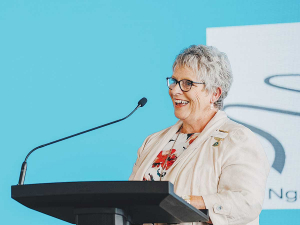Rural Women NZ appoints new chief executive Sandra Kirby
Rural Women New Zealand (RWNZ) has announced Sandra Kirby will take over as the organisation's new chief executive.
 RWNZ national president of Gill Naylor says a one-size-fits-all approach on health will not work for rural communities.
RWNZ national president of Gill Naylor says a one-size-fits-all approach on health will not work for rural communities.
Rural Women New Zealand (RWNZ) is calling for the Government to work with rural communities on rural health.
RWNZ national president of Gill Naylor says rural communities need full resourcing based on their needs.
“A one-size-fits-all approach will not work,” Naylor told Rural News.
RWNZ wants to see a fully resourced co-design programme with rural communities. Naylor says this would identify health and wellbeing needs of the community and develop a plan for servicing those needs.
Her comments come just two months after Health Minister Andrew Little agreed to have a rural health strategy in the Pae Ora Healthy Futures Bill, which passed into law last month.
But Naylor points out that saying there will be a strategy isn’t enough.
“There needs to be a plan in place to make the strategy work and adequate resources in order to enable that plan to be implemented.”
She says a list of changes need to be implemented to help the sector, including changes to immigration policies for nurses, midwives, GPs and other health industry staff.
Naylor believes that NZ needs to make residency and citizenship pathways look more attractive to these workers. She adds also in need of urgent attention is the training to practice pipeline for nurses and nursing students.
“What has been the education pathway has clearly not been working with the lack in numbers of qualified staff so look at other ways of training nursing staff.”
She says one idea could be to move back into the hospitals with on-the-job training with a component of regular uni-based theory to complement.
Naylor would like the sector to be more realistic about salary scales and payment.
“We will keep losing staff overseas as salaries are not keeping up with international expectations.”
One thing that won’t work right now, Naylor believes, is increasing telehealth services.
“Many rural communities do not have the digital capacity or access to reliable internet, and many don’t have cellular coverage. This is not to say that rural communities won’t take up the opportunity to use telehealth, they just can’t access it, through no fault of their own.”
Horticulture New Zealand (HortNZ) says a new report projects strong export growth for New Zealand's horticulture sector highlights the industry's increasing contribution to the national economy.
Fonterra shareholders say they will be keeping an eye on their co-operative's performance after the sale of its consumer businesses.
T&G Global says its 2025 New Zealand apple season has delivered higher returns for growers, reflecting strong global consumer demand and pricing across its Envy and Jazz apple brands.
New Zealand's primary sector is set to reach a record $62 billion in food and fibre exports next year.
A new levying body, currently with the working title of NZWool, has been proposed to secure the future of New Zealand's strong wool sector.
The most talked about, economically transformational pieces of legislation in a generation have finally begun their journey into the statute books.

OPINION: Federated Farmers has launched a new campaign, swapping ‘The Twelve Days of Christmas’ for ‘The Twelve Pests of Christmas’ to…
OPINION: It used to be that the National Fieldays attracted brickbats for being officious clipboard carriers, while the regional, farmer-run field…